In case you missed it, Paul Fell summarizes the growing, and increasingly official, war on the free press.
On one hand, we have a Civil War festering within the nation, by which I mean without the benefit of one set of states going off in one direction and another set staying put. Instead, the rebels are scattered throughout the country, hiding behind the protection of the Constitution they work to overthrow.
That’s not theoretical. Trump has specifically said he’d like to ignore portions of the Constitution that stand in the way of his ambitions, while, at the same time, insisting that “I’ll drive the getaway car while you rob the bank!” is protected free speech rather than part of a criminal conspiracy.
And, while his personal rights and the Second Amendment are held sacrosanct, we’ve seen the police of Marion, Kansas, sweep into the offices of the local paper and grab everything: Not just the notes they were apparently looking for, but irrelevant papers as well as computers and cell phones.
In other words, they didn’t just search for illegally obtained documents. They put the newspaper out of business, or, at least, did their best to.
One piece of perspective is that people keep noting that Trump is the first former president to be indicted, which is true, but only because John Tyler died less than a year after Fort Sumter. Had he lived to the end of the war, his shift from ex-president of the US to a member of the Confederate legislature would have come up for discussion.
Another is that, while the Washington Post and NY Times would not have been liable for printing the Pentagon Papers, had Nixon’s “plumbers” not gone to such outrageous extremes in pursuit of the leak, Daniel Ellsburg would have been prosecuted for giving them to the press.
The charges against Ellsburg were dropped over prosecutorial misconduct. Charges against the press never happened because of First Amendment protections.
Still, might makes right, and Greg Kearney repurposes an old journalistic saying, that freedom of the press belongs to those who own one, but applies it to the bully boys who shut down the Marion County Record.
Another piece of perspective: Searching for a particular document, or its source, does not require such meat hammer tactics. When investigators subpoenaed my notes from an interview with a suspected murderer, it happened quietly, in my office. It began politely, then got a little tense as the investigator warned me that Maine had no shield law to protect journalists and I assured him I would confirm what I’d printed but would not testify about unpublished materials.
But the rest of the paper went on without disturbance.
On one hand, this makes the outrage in Kansas of less concern, because once it bounces up a level or two, the grownups should correct the Barney Fife actions of the local yokels. (UPDATE: This appears to be happening, thanks to the county prosecutor.)
On the other hand, take another look at Kearney’s cartoon and ask yourself if this might be a harbinger of the future, and not the distant future but maybe next week.
Walt Handelsman is voting for “next week” and, for that matter, right now.
You may not care about the Marion County Record, and you may have never even heard of the Marion County Record until this week. Most people hadn’t.
But this isn’t about the Marion County Record. It’s about the right of the people to know what’s going on in their communities. It’s about Thomas Jefferson’s insistence that
The basis of our governments being the opinion of the people, the very first object should be to keep that right; and were it left to me to decide whether we should have a government without newspapers, or newspapers without a government, I should not hesitate a moment to prefer the latter. But I should mean that every man should receive those papers and be capable of reading them
By Jefferson’s standards, attempts to close down a local paper — any local paper — are as much an act of disloyalty as anything that happened in Washington on January 6.
Except for the part where it succeeds.
Juxtaposition of the Day
Constant Readers may know how much I dislike the Will Rogers approach suggested in Prickly City, the casual shrug and “Whatcha gonna do?” response in which Congress is no more than a straw dog to be mocked instead of confronted. In political commentary, it’s the equivalent of a Henny Youngman “Take my wife” gag: More predictable than insightful.
Ramirez offers a more challenging viewpoint, because he lays out a seemingly reasonable challenge, but then declines to define “America’s Interest,” making the cartoon meaningless. Either we need people to stand up and challenge the emerging authoritarians, or we need people to stand up and support them.
Whichever you prefer.
Clay Jones assembles a group of leaders who prefer shutting down the free press, and it would be an extreme exaggeration had Trump not already aligned himself with these “strong leaders,” not only attacking the media but working to partner with Putin on projects and praising China’s murderous crackdown on the protesters in Tianamen Square.
The only one missing is Mohammid Bin Salman, who ordered the murder of Jamal Khashoggi and is currently suspected of using his financial power to lean on Vice and discourage them from reporting bad news about Saudi Arabia.
Which brings up another element of the attack on the press, not one of police storming into newsrooms but, rather, of well-heeled plutocrats launching endless, ruinous lawsuits against small papers that, as one editor said, then have to choose between paying their staff or paying their attorneys.
And then there is the propaganda approach Chip Bok (Creators) adopts, that of undercutting actual journalism by deliberately denying the word of witnesses who testify before Congress and of those who report on their sworn testimony.
The anti-Biden contingent finally brought in a witness to Hunter Biden’s alleged influence peddling, only to have him testify that it never happened, that Hunter was simply a bullshitter.
In response, Bok shows Biden actually meeting with a panel of thugs — not industry figures — suggesting that Devon Archer lied when he said the only contact was brief, perfunctory introductions by phone in which nothing material was discussed.
Which raises the question of why we need a First Amendment or an independent press.
People, after all, will believe what they are told is true.
About Emmanuel Goldstein.
About George Soros.
About the Biden Crime Family.
About the sum of 2+2.
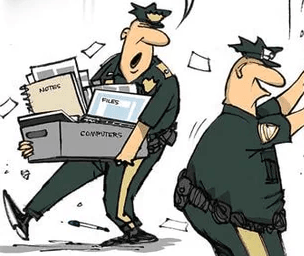

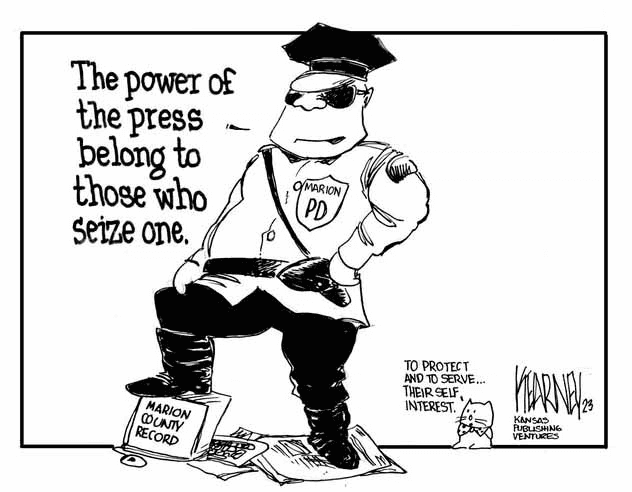
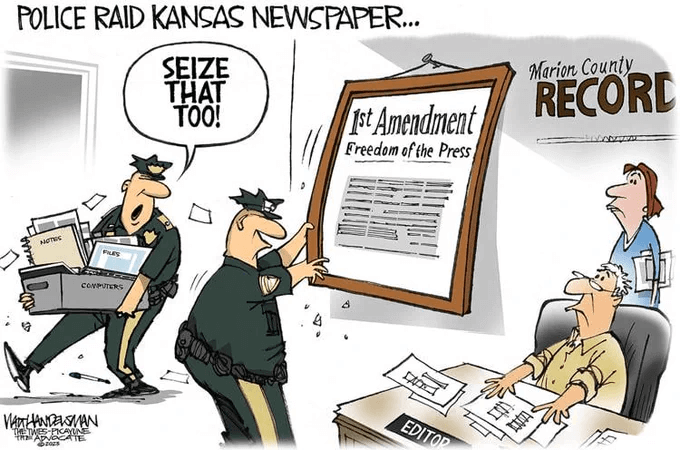


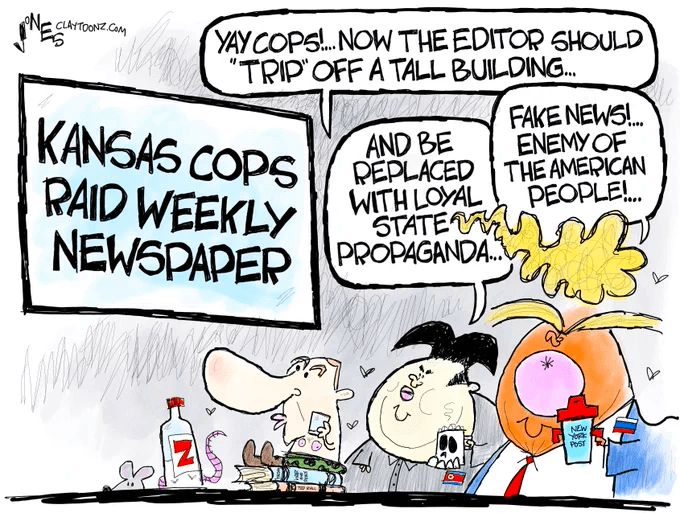
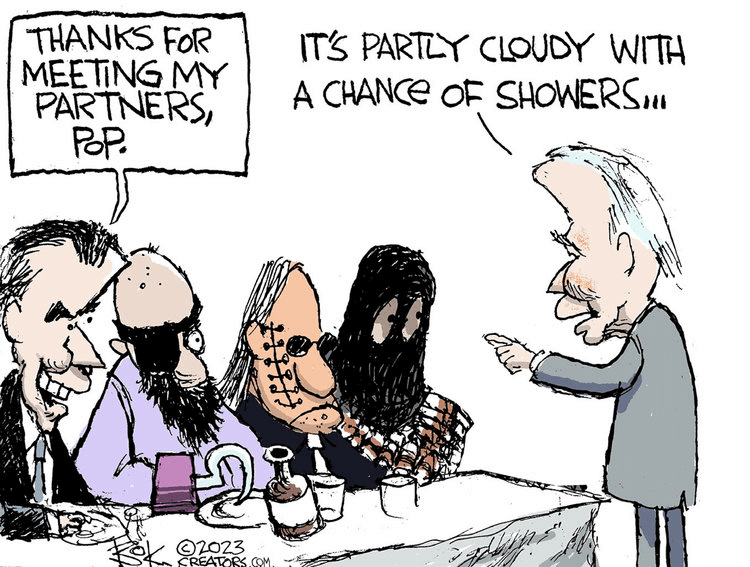
I believe you meant Henny Youngman rather than Rodney Dangerfield. Youngman offered to let the audience “Take my wife–please.”
I don’t get no respect, but thanks. Changed.
Replace “Congress” with “the Rep*blican Party” and Ramirez’s cartoon works perfectly.
I disagree with Ramirez about a lot but I have to give him props for his offering—including the current Mission Impossible gang (including Ving Rhames and Simon Pegg) is pretty clever and a little unexpected in a political cartoon. (I’d have expected the typical route to be drawing Peter Graves and expecting everyone to know who that was.)
It reminded me of how there were a smattering of Doctor Who-related gags going around at the start of Brexit but not all of them made the effort to draw Peter Capaldi.
Well said about Ramirez’s cartoon. It all depends on what the reader thinks “America’s Interest” is.
Some people genuinely believe that authoritarianism and stripping away freedom of the press will solve America’s problems. After all, if it happened in 1930s Germany, it can happen in 2020s America.
And that Chip Bok cartoon is just stupid, if only for depicting the Bidens with some random thugs and not oily businessmen in designer suits. Because those are the real criminals.
I thoroughly enjoy the political cartoons on this site but I have to refrain from reading the comments of ultra left opinions of the editor. He’s decided he’s right with his left opinions
How is it that being opposed to authoritarian tyranny makes one ‘ultra-left’?